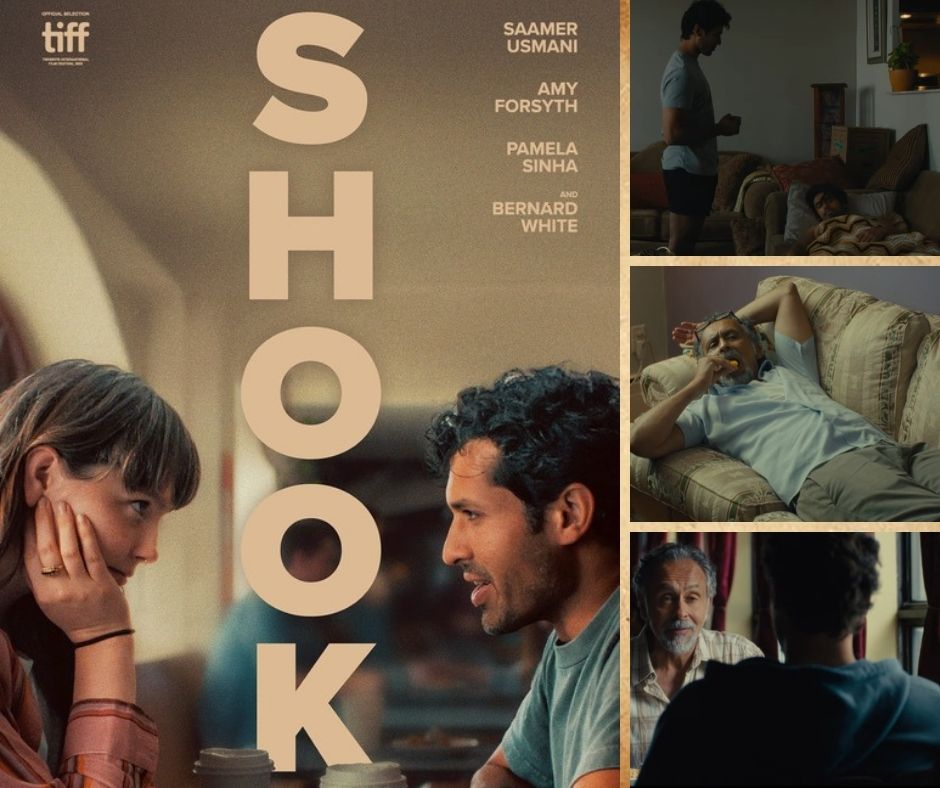Shook
An Authentic Portrait of the GTA

Having lived in downtown Toronto for four years, with friends scattered across the suburbs, I’ve made commutes much like the one in the opening minutes of Shook. There’s always a moment on that ride when my heart skips a beat. After the dim tunnels stitched into downtown’s core, the train bursts into daylight. The skyline falls away, the streets open up, and real trees appear—not the scattered ones between slabs of concrete, but the fuller, more natural kind. In that instant, the city shifts toward the calm of the neighbourhoods. Amar Wala captures that transition with precision, folding it into a portrait of Scarborough that also works as a time capsule, capturing family-run restaurants, small markets, and familiar blocks, some already gone. Few films have captured the GTA with this much intimacy.
Very much shaped by this lifestyle is Ashish, an Indo-Canadian writer in his mid-20s living in Scarborough. At coffee shops, he gives easier English names so baristas won’t struggle to pronounce his, and even when they insist, he shortens it to Ash. He is caught between his career ambitions downtown and reconnecting with his estranged father, recently diagnosed with Parkinson’s, in a family already fractured since his mother discovered his father’s infidelity. Along the way, he begins a romance with Claire, a woman, like many in Toronto, whose time here has an expiry date, already set to leave for school in Montreal. Shook moves through familiar beats of city life and the second-generation experience, caught between cultural roots and the pull to fit into Canadian life.
Much of the film draws on Wala’s own experiences growing up in the GTA while navigating his father’s Parkinson’s diagnosis. His feature debut expands on a 2018 short of the same name, which captured a pivotal moment when Ashish, after weeks of avoiding his father, is confronted by him in a restaurant and learns of his illness. Working with co-writer Abdul Malik, Wala shaped Ashish into more than a stand-in for himself, building from that scene into a broader portrait of life in the GTA, rich with relationships, textures, and everyday details.
Wala directs with a confidence, and every choice has meaning. In the doctor’s office scenes, he holds the shot for a few extra seconds as Ash and his father walk in, letting a faint apprehension settle before the conversation begins. Elsewhere, the film unfolds with a lived-in rhythm, giving space for life’s pauses, but never becoming slow. There’s warmth in the mother’s home, contrasted with the sunlight-filled yet hollow and messy apartment of the father (he earned his freedom, but at what price?). A scene framed through a mirror shows mother and son together, evoking a unity that existed before it was broken, and her determination to keep some of it alive.
This authenticity extends to every relationship, from the easy charm of Ash and Claire’s early interactions—funny, romantic, and played with wonderful chemistry—to the natural bonds with friends and family. The film’s sharp sense of humor comes mostly through his friends and brother, with delightfully funny side moments (losing the last train by a second), well-timed lines (“can I have my food?”), and jokes that feel organic to the world. Over time, the city itself starts to feel like the real protagonist, with Ash reflecting its lifestyle: guarded, shaped by temporary connections that serve the moment but rarely build toward permanence. It is the kind of environment where a relationship can continue even with a countdown to its end, where planting without roots feels natural. Claire has already adapted to that rhythm, and encourages Ash to do the same.
This transience could have been balanced by the relationship with his father, offering a counterpoint, a push toward depth and reconciliation. Instead, while they do grow closer, the film’s emotional weight feels at odds with its dialogue, as if the connection were becoming more tolerant of past mistakes but not necessarily deeper. The title Shook could apply both to the father’s illness and to the protagonist’s emotional state, yet by the final act, the illness drifts from focus, and their last pivotal scene together doesn’t land with the impact it reaches for. The result is a film more powerful as a snapshot of life than as a fully realized character journey.
Still, Wala’s touch is deeply empathetic. Every frame feels lived in, every street corner and café feels like someone’s memory. As a portrait of Scarborough and the GTA, Shook is among the most genuine and precise I’ve seen, even if its emotional punch is just a hair away.